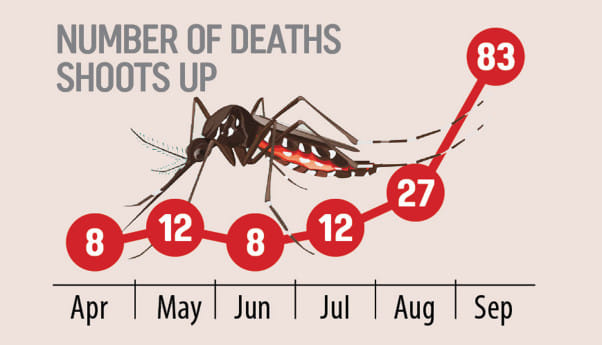Reinfection, late hospitalisation to blame: experts

With the deaths of 23 dengue patients over the last four days, experts have said late hospitalisation and reinfections are some of the main causes of this year's fatalities.
They also cited a lack of testing facilities in government primary healthcare centres and the country's overall poor healthcare system as reasons.
Till yesterday morning, 166 patients have died so far this year -- 80 of whom died in July alone -- and the number of dengue cases stands at 32,082.
According to the Directorate General of Health Services, the dengue death rate so far this year is 0.51 percent, up from last year's 0.50.
Prof Ahmedul Kabir, former additional director general of DGHS, said many of the cases they have received are reinfected patients.
To avoid risks, patients will have to be admitted to hospital immediately after noticing signs and symptoms, which include nausea, abdominal pain, diarrhoea, respiratory issues, weakness, fluctuating body temperature and reduced urination, he said.
Kabir also urged people to go to hospitals in their own districts. "There's no need for referrals [to hospitals in the capital] unless the patient is at a critical stage.
"Local-level hospitals are capable to manage dengue patients. A patient's condition can deteriorate during the journey," he said, adding that the government has opened separate dengue units in all medical college hospitals.
ABM Abdullah, a medicine expert, said the pattern of the infection has changed and some symptoms do not show.
"As a result, a patient's situation can suddenly turn critical."
He added that patients who are infected for the second or third time are more prone to reaching the critical stage compared to those infected for the first time.
"This year, the number of reinfected patients may be higher, causing the number of deaths to be higher."
Abdullah also said any patient with the symptoms of light fever, runny nose and body pain must consult a doctor immediately.
"Early diagnosis and treatment can prevent death from dengue."
Mushtaq Hussain, a public health expert, said changes in the current treatment strategy and management are needed to bring down the mortality rate.
"If the government classifies and divides treatment into three parts – primary, secondary and tertiary – it'll be easier to manage the patients, and the death rate would come down."
He also said the primary healthcare system is in need of due development.
"In Dhaka, people don't get dengue testing facilities in the primary healthcare centres and so, they are also deprived of primary treatment. This results in late diagnosis, especially for those from poorer families."
Mushtaq suggested setting up more blood collection centres for dengue patients in Dhaka, adding that the government should also develop secondary healthcare facilities for patients who need to be under observation.
"This'll reduce the pressure on medical college hospitals."
He added that city corporation and railway hospitals can be used for secondary healthcare, and critical patients can be shifted to medical college hospitals from there.
Without decentralisation and reorganisation of the healthcare facilities, it is not possible to bring down the number of dengue deaths, Mushtaq said.
HM Nazmul Ahsan, associate professor at Shaheed Suhrawardy Medical College Hospital, said that in Sri Lanka, the dengue fatality rate was 0.04 percent in July, thanks to the country's systematic methods and modern healthcare management.
Health workers there update the national database immediately after a patient is detected and actions are then taken based on the data.
"Public health teams go to the patient's house, check the surroundings for Aedes breeding grounds, and destroy [them] if found. They also check for others who may be infected."
The teams then make a follow-up visit after a week and take legal action against residents if Aedes breeding grounds are found, he said.
The chief of Sri Lanka's dengue management committee is the president, while the army chief, ministers and top law enforcement officials are also involved.
"Bangladesh's anti-mosquito programmes aren't as coordinated as theirs," Nazmul added.
He further said many of the patients being admitted to hospital this year are already in a critical condition.
In many cases, he said, testing kits gave false results. "And so, patients ended up coming to hospital after their condition was already dire."
He urged immediate consultation after a fever and getting a Complete Blood Count test done on the third and fourth days of fever, even if the NS1 test (done to detect dengue) comes negative.
DENGUE CONTROL COMMITTEES
Meanwhile, the government on Monday formed two six-member committees comprising experts to control the dengue outbreak.
Administrators of Dhaka's two city corporations were made convenors of the committees, while their executive officers were made member secretaries.
AF Hasan Arif, adviser of the local government, rural development and cooperatives ministry, at a programme in his office said both short- and long-term plans should be made to tackle the country's dengue situation and expert opinions will have to be prioritised.
"We're now in the super peak season of dengue. I hope the committees formed with experts will play an effective role in the two city corporations to deal with the situation."




 For all latest news, follow The Daily Star's Google News channel.
For all latest news, follow The Daily Star's Google News channel.
Comments